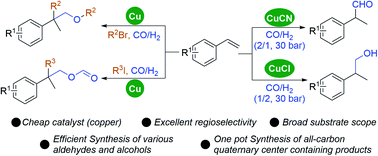Abstract
Hydroformylation catalyzed by transition metals is one of the most important homogeneously catalyzed reactions in industrial organic chemistry. Millions of tons of aldehydes and related chemicals are produced by this transformation annually. However, most of the applied procedures use rhodium catalysts. In the procedure described here, a copper-catalyzed hydroformylation of alkenes has been realized. Remarkably, by using a different copper precursor, the aldehydes obtained can be further hydrogenated to give the corresponding alcohols under the same conditions, formally named as hydroxymethylation of alkenes. Under pressure of syngas, various aldehydes and alcohols can be produced from alkenes with copper as the only catalyst, in excellent regioselectivity. Additionally, an all-carbon quaternary center containing ethers and formates can be synthesized as well with the addition of unactivated alkyl halides. A possible reaction pathway is proposed based on our results.



 Please wait while we load your content...
Please wait while we load your content...